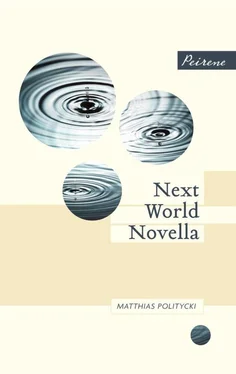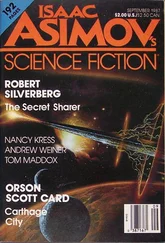Matthias Politycki - Next World Novella
Здесь есть возможность читать онлайн «Matthias Politycki - Next World Novella» весь текст электронной книги совершенно бесплатно (целиком полную версию без сокращений). В некоторых случаях можно слушать аудио, скачать через торрент в формате fb2 и присутствует краткое содержание. Год выпуска: 2011, Издательство: Peirene, Жанр: Современная проза, на английском языке. Описание произведения, (предисловие) а так же отзывы посетителей доступны на портале библиотеки ЛибКат.
- Название:Next World Novella
- Автор:
- Издательство:Peirene
- Жанр:
- Год:2011
- ISBN:нет данных
- Рейтинг книги:4 / 5. Голосов: 1
-
Избранное:Добавить в избранное
- Отзывы:
-
Ваша оценка:
- 80
- 1
- 2
- 3
- 4
- 5
Next World Novella: краткое содержание, описание и аннотация
Предлагаем к чтению аннотацию, описание, краткое содержание или предисловие (зависит от того, что написал сам автор книги «Next World Novella»). Если вы не нашли необходимую информацию о книге — напишите в комментариях, мы постараемся отыскать её.
Hinrich takes his existence at face value. His wife, on the other hand, has always been more interested in the after-life. Or so it seemed. When she dies of a stroke, Hinrich goes through her papers, only to discover a totally different perspective on their marriage. Thus commences, a dazzling intellectual game of shifting realities.
Next World Novella — читать онлайн бесплатно полную книгу (весь текст) целиком
Ниже представлен текст книги, разбитый по страницам. Система сохранения места последней прочитанной страницы, позволяет с удобством читать онлайн бесплатно книгу «Next World Novella», без необходимости каждый раз заново искать на чём Вы остановились. Поставьте закладку, и сможете в любой момент перейти на страницу, на которой закончили чтение.
Интервал:
Закладка:
He forced himself to turn his full attention to his wife. She had become a little less familiar with no colour in her cheeks. Having said that, even during her lifetime she had somehow always been distant and strange in spite of her daily presence. Perhaps because of his middle-class origins, which made him ill at ease in an eight-room apartment with such elegant furnishings. Or perhaps because of her ikebana flower-arranging sessions and her meditative silences. She talked to plants and engaged with objects in her mind; her intuitive nature was not only quick to understand human relationships but also went straight to the heart of the inanimate world. Everything whispered its meaning to her, a meaning that eluded Schepp, meticulous philologist though he was.
For him, her attraction probably lay in that very attitude. She did not need cheerful company, she was in constant touch with things both higher and more profound. Bringing up the children, looking after a rather remote freelance Sinologist, seemed to be all that linked her to the pitiful world this side of the grave. In the evenings she usually sought the company of the I Ching, equipping herself for the challenges of the future, no doubt also of the next world. Before every important decision she sought the advice of the ancient signs. Usually the outcome was good. However, as the years passed she had become ever quieter, more fragile, almost transparent. She did not often smile at Schepp, or take him in her arms to tell him about the cold, dark lake. Or was that just her way of avoiding the conversations that a husband and wife should really have? Schepp could never again touch the heart of her life’s secret, as he had on that day when, faced with an isle of the dead, their lives had been decided. Admittedly he had at best a very vague idea of the nature of Doro’s fear of the next world. Probably because as a man who did not know much about mysticism he was bound to ask the wrong questions, inevitably conveying some of his own slight distaste, or the derision that would be hard for him to suppress, or his categorical doubts. And of course Doro sensed that. At least, she never tried to discuss the matter with him.
How different she was when it came to praising or criticizing his essays and papers! Schepp glanced across the top of the desk, lingering where there was nothing, now, between Doro’s hands but a dark mark on the leather surface — and then he remembered what it was that he wanted to do. He found the manuscript, with the final page added by Doro on top. Sorting through it quickly, he glanced over her notes in the margins and between the lines without really understanding them. At last he had all the sheets in the correct order, with Doro’s closing comments at the bottom of the pile. He could begin reading.
But that was impossible. Who could read in this situation, beginning at the beginning, reading every word? There was also the fact that the pages began with his own text, the work he had surely discarded long since. It was absurd. Schepp kept looking through them again and again, at the place where Doro’s closing comments began — how familiar her writing was! At least there was that to cling to.
But as soon as he began dipping into the manuscript, the sight of her handwriting made him feel perplexed. Increasingly uneasy, then downright discontented. How could he bear to read what she had written on that final page? Doro had probably not been responsible for her own actions so close to the end. Schepp put that sheet aside quickly, but his eyes lingered on another one of the last pages: ‘I am under some pressure, because I must finish this farewell letter tomorrow.’ Oh God, what had she been intending to do? Did she realize that her own death was imminent? Or, as she wrote what she wrote, had she even — even anticipated it, gone to meet it? No, out of the question, Doro would never have done such a thing.
Or would she?
That morning, Schepp reluctantly turned back into what he had been all his life, a patient interpreter of primary sources. At the end of his typescript, Doro’s notes began with a question mark in the margin, and on the back of the final sheet she had written an abrupt ‘As if he would have said such a thing in that situation’. Within the text she had crossed out the name of a bar and substituted the name of his local. What was the point of that? Equally puzzling was the marginal question mark nearer the beginning: ‘Why not just call him Hinrich and be done with it?’ Schepp leafed through to the conclusion again. ‘You and I know that’s not the end of the story.’ Good heavens, it sounded as if he would have done better not to read it at all.
But to take the comments in at a glance was impossible. He had to read the entire manuscript. Read it from the beginning, or it would be far more difficult to endure. And he really wanted to know, for now he was feeling angry, reproaching Doro, and at the same time he was horrified by the strength of the anger building up inside him. There should be no rancour, no harsh words in the face of death. There must be a misunderstanding. He only needed to read the manuscript from the beginning, then Doro’s final lines would surely make sense. Yes, now Schepp really did want to know what she had intended to discuss with him, and why she had chosen this particular manuscript, one he had never shown her because … because he had decided it was a miserable failure and resolved not to pursue his ambitions to write fiction. He had never regretted the decision, or he would hardly have become the authority he undoubtedly was among Sinologists. Very well, so the novel he had tried to write back then, Marek the Drunkard , had come to such a hopeless dead end on page twelve that he had had no idea how to continue, and he had abandoned it. Only to add a few more wild, frantic scenes which he then destroyed immediately out of embarrassment, or at least he had tucked them away somewhere safe.
Marek the Drunkard . No sooner had Schepp begun reading at last, beginning with the first line, than he noticed that he was not really concentrating. At first he read as if in a trance, instantly forgetting each word. Then he skipped entire scenes, not wanting to linger line by line over a manuscript he had picked up only because of Doro’s final comments, wishing still less to dwell on her detailed deletions, rephrasings and additions. The church clock struck twelve. He perceived the sound like an admonition to devote himself to reading the pages with the gravity they required. Shafts of sunlight shone into the room. He saw the motes dancing in them. Schepp now stood at the tall reading desk at the far end of the room, where the light was noticeably more muted. He shifted his gaze wearily to the back of Doro’s head, her black and silver shock of hair falling over the chair-back, and noticed a fly circling in the air. With some effort he moved and shooed it away.
His gaze passed over the gladioli to the chaise-longue , and he remembered how, in the early years of their marriage, Doro would often lie there reading while he worked at the desk, both absorbed in their separate occupations yet not alone. This arrangement struck him as ideal for the situation in which he found himself.
It was not easy to lift Doro out of the chair. Her shoulders were already stiff, while the rest of her was so limp that she kept slipping from his grasp. When he had finally got a firm hold on her he felt the dampness of her kimono; the fabric around her hips was soaked. But he managed to downplay the awkwardness of this through assiduity — Doro lay so light in his arms, so light.
When he had laid her on the chaise-longue a little sigh escaped her, which terrified him. Would she suddenly open her eyes? He so hoped she would that the idea almost frightened him. He even held his breath, but Doro remained motionless. The marks of livor mortis on her forearms were large now, you couldn’t miss them; good thing the kimono had sleeves to cover them.
Читать дальшеИнтервал:
Закладка:
Похожие книги на «Next World Novella»
Представляем Вашему вниманию похожие книги на «Next World Novella» списком для выбора. Мы отобрали схожую по названию и смыслу литературу в надежде предоставить читателям больше вариантов отыскать новые, интересные, ещё непрочитанные произведения.
Обсуждение, отзывы о книге «Next World Novella» и просто собственные мнения читателей. Оставьте ваши комментарии, напишите, что Вы думаете о произведении, его смысле или главных героях. Укажите что конкретно понравилось, а что нет, и почему Вы так считаете.












